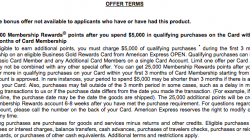The last 2 years haven’t been kind to frequent credit card applicants. We may think of ourselves as “valued” customers, but the banks and their data mining techniques disagree. We don’t carry interest-bearing balances. We don’t pay annual fees. And we don’t stick to a single card for every purchase, instead trying to maximize category bonuses across multiple cards. Is it any wonder card issuers don’t seem to love us anymore?
While there are still credit cards to be had, the largest two operators – American Express and Chase – have now implemented specific rules to cut down on those of us who tend to get the same credit cards more than once.
In the case of Chase, the rule is unaffectionately known as “5/24” and refers to the fact that Chase will not approve you for a new credit card, even if you’ve never had that card before, if you’ve opened more than 5 new credit cards across all issuers within the last 24 months. 5/24 currently applies to Chase’s Ultimate Rewards series of personal cards, but the Doctor of Credit reports that it is soon to be rolled out to the Chase Ink business cards and then eventually to all of Chase’s co-branded cards as well.
On the other hand, Amex has employed what would seem at first glance to be an even harsher rule. Basically, if you’ve gotten the signup bonus for a card in the past, that’s it – you can never get that signup bonus again. Originally this once-per-lifetime rule only applied to personal cards, but as of last month it’s been expanded to include Amex’s business products as well.
While both rules are clearly designed to dissuade frequent card applicants, it would appear Amex is coming down harder than Chase. At least Chase allows you to get the bonus again at some point if you stop applying for cards, right? Amex doesn’t care – once you’re out, you’re out.
But if we drill down into the details and workarounds, is it possible that Chase’s 5/24 is actually worse?
You can get Amex cards again. Just not signup bonuses.
Despite some confusion on this point, Amex’s once-per-lifetime rule applies to their signup bonuses, not their actual cards. If you’ve had a personal Amex Platinum card before, canceled it, and now want to get it again, Amex will be more than happy to give you another one with all the identical benefits normally afforded a Platinum cardholder. It just won’t come with whatever signup bonus is promised in the application link.
However, if you’ve had a Chase Sapphire Preferred and want it again but you’ve opened 5 credit cards in the last 2 years… too bad. You can’t have one, even without the signup bonus. You simply won’t be approved no matter what.
Now, I can hear the Conventional Wisdomers already… “What’s the point of getting a card if it doesn’t come with a hefty signup bonus?”
Yes, the signup bonus is part of what makes signing up for a new card attractive. However, it’s far from the only element. Access to the Centurion lounges is a super nice feature of the Amex Platinum. Earning 1.5x points on every dollar spent with an Amex Everyday Preferred when making 30 monthly transactions is also useful, as is keeping Membership Rewards points safe by hanging onto one.
But if you don’t have a Sapphire Preferred or an Ink Plus and you want to transfer any other Ultimate Rewards points out to Hyatt or United? Not going to happen if you’re over the 5/24 limit.
Targeted offers without once-per-lifetime language.
A few successful applications have been reported outside of the Chase 5/24 guidelines, but in general the rule has been applied pretty thoroughly and completely by Chase. It’s the rare applicant who’s gotten a personal Chase card since April after opening more than 5 new accounts in 24 months.
However, while Amex has only just implemented their once-per-lifetime rule across their business cards, it has not been unusual to find targeted offers that do not include this restriction (or in many case any restriction on past bonuses at all). It remains to be seen if we’ll see more or fewer of these targeted offers going forward, but based on past performance, it’s unlikely Amex would completely stop sending out unrestricted offers.
There is also evidence that sometimes Amex “forgets” you once had a card, which makes you eligible for the signup bonus again. While it’s not guaranteed to happen, nor is it clear exactly how long this takes (in most cases at least a few years and possibly as many as 7 years), it’s easy to find out exactly which past cards Amex has on record for you – simply call or send an online chat message and a customer service rep will be happy to tell you.

In other words, while Chase’s 5/24 rule is effectively inviolable for frequent card applicants, there are at least a few ways that Amex’s once-per-lifetime policy doesn’t always mean “once per lifetime.”
Chase cards aren’t worth the 5/24 rules.
Needless to say, there’s an easy way around the Chase 5/24 restriction — just stop opening credit cards, and after 24 months (or less unless you applied for all 5 of your most recent accounts on the same day), you’ll be eligible for Chase cards again.
Except as I’ve argued in the past, Chase Ultimate Rewards is absolutely not worth foregoing all new credit cards for two years. Sure, it’s a good program, but it has seen its share of partner devaluations in the last few years (think about the changes Southwest and United have made), and Chase has made no attempts to offset those devaluations.
In the meantime, Citibank has made enormous strides with their ThankYou program and Amex, while losing co-branded partners, has mostly managed to keep their Membership Rewards program on an even keel (the British Airways transfer ratio devaluation being a notable exception).
Chase is now reportedly about to add all their co-branded cards to the 5/24 rule as well. This seems incredibly shortsighted. I find it hard to believe Chase’s co-branded partners will be particularly happy when they realize that their own cards have been declared off limits because a potential customer signed up for too many of their competitors’ cards.
I have no doubt Chase has data to support this decision, but the whole plan to include co-branded cards seems like a case of cutting off your nose to spite your face.
The Devil’s Advocate gets the why, but not the how.
These people are a problem for banks. We’re reliable but unprofitable customers. So it’s understandable that banks would implement policies to keep these applicantions to a minimum and the 5/24 rule is aimed directly at us. Chase knows most people don’t open 5 credit card accounts within 24 months. Heck, most people don’t open 5 credit cards in their entire life.
This doesn’t mean 5/24 is forever. Chase has adjusted their policies on signup bonuses before. In fact, they used to have the same once-per-lifetime policy that Amex now uses. The current restrictions in the actual Chase card signup terms and conditions actually say nothing about 5/24, but instead state that you can only get the signup bonus once every 2 years. So I suppose if someone wanted to apply for nothing but Chase cards, they could do so. But I wouldn’t recommend it.
Amex’s current policy isn’t without problems either. Gary at View From The Wing relates the story about the head of U.S. Bank Flexperks being surprised to learn he was denied a signup bonus for a Starwood Amex because he had the card years before (a case of the account not falling off Amex’s records). Gary notes that Amex has also loosened the rules on signup bonuses in the past and suggests they might eventually be forced to do so again for customer acquistion reasons. I personally agree and even made it one of my predictions for 2016 (yeah, I know that isn’t looking so good right now, but it’s only March so sit tight).
Regardless, while in theory 5/24 may seem less onerous than a once-per-lifetime restriction, in practice it’s a bigger enemy to points and miles enthusiasts. So in the words of Sun Tzu, “if your enemy is superior… find a targeted Amex offer.”
Devil’s Advocate is a bi-weekly series that deliberately argues a contrarian view on travel and loyalty programs. Sometimes the Devil’s Advocate truly believes in the counterargument. Other times he takes the opposing position just to see if the original argument holds water. But his main objective is to engage in friendly debate with the miles and points community to determine if today’s conventional wisdom is valid. You can suggest future topics by following him on Twitter @dvlsadvcate or sending an e-mail to dvlsadvcate@gmail.com.Recent Posts by the Devil’s Advocate:
- Did Following My Own Advice Save My Serve From Armageddon Part Deux?
- Why I’m Giving Up My Hyatt Diamond Status
- Are The Feds Trying To Shut Down Manufactured Spend?
Find the entire collection of Devil’s Advocate posts here.








